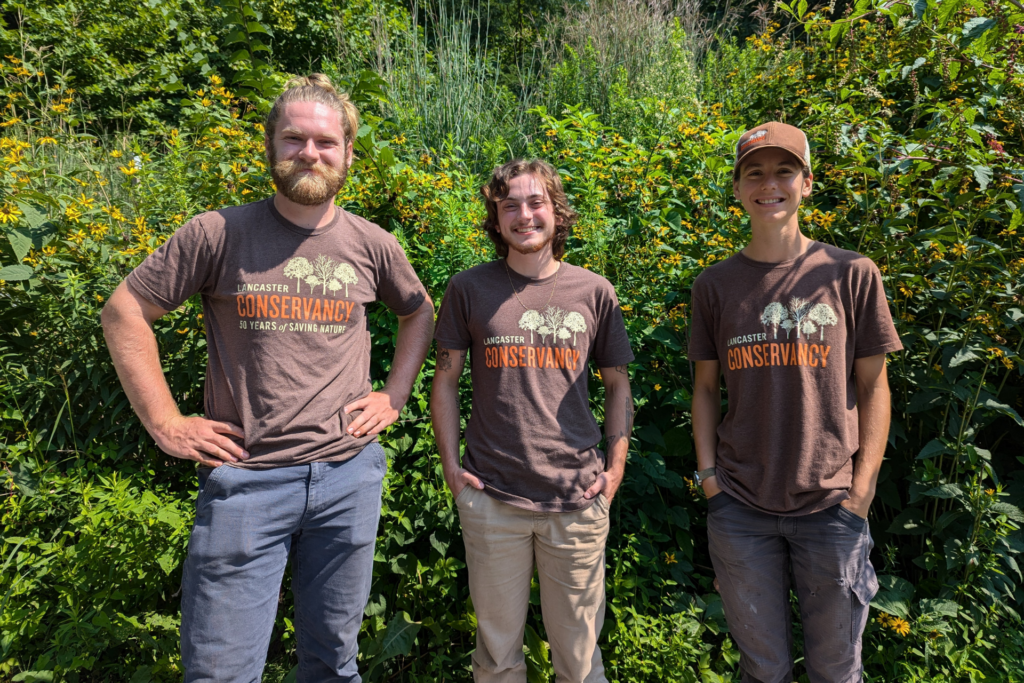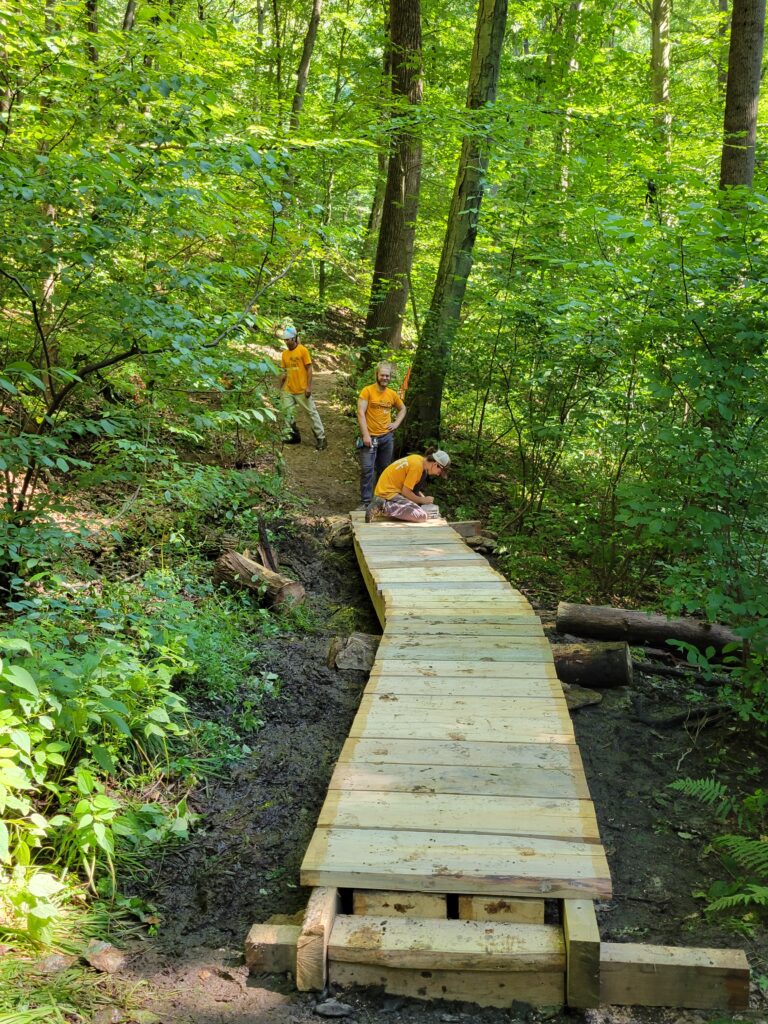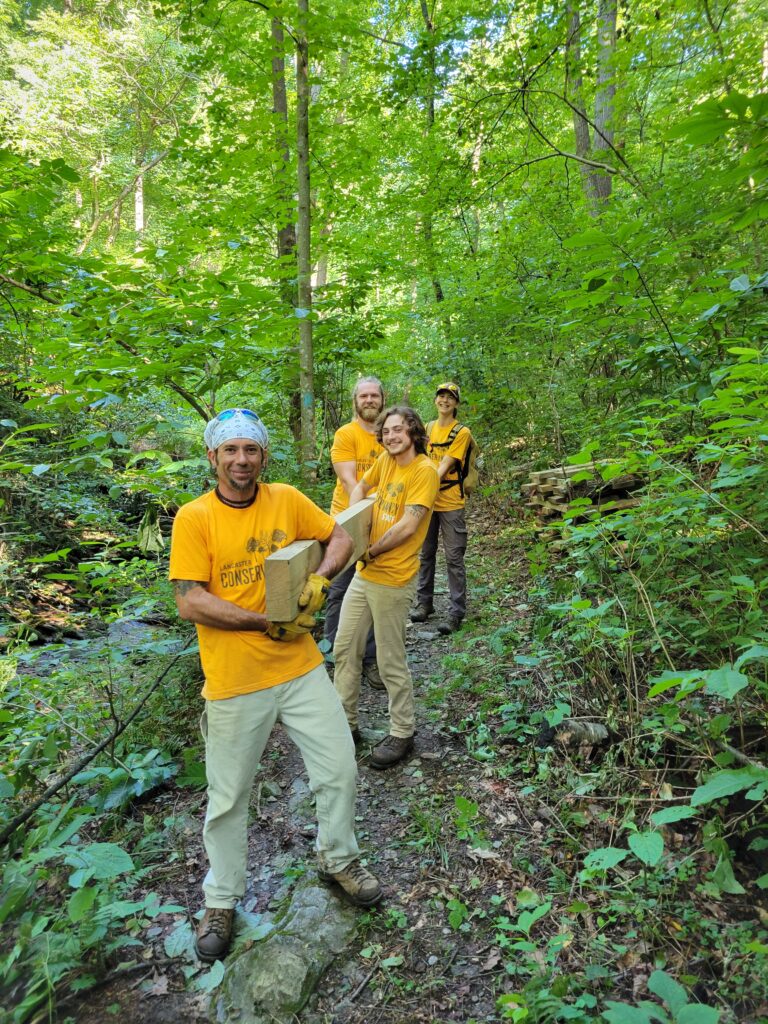The Lancaster Conservancy Summer Stewardship Crew is a green-collar job initiative that enables crew members to get hands-on experience training with our stewardship experts while providing some much-needed labor to support our preserves.

2024 Summer Stewardship Crew (Photo by Avery Van Etten)
“For students pursuing a career in conservation, it can be challenging to make the leap from the academic world to the job market. Our seasonal employees get experience in trail construction, carpentry, equipment use and maintenance, plant management, and other topics that are extremely valuable to potential employers. By offering this opportunity, we help those students to bridge the gap between education and employment, which supports the future of conservation work in our area,” said Lancaster Conservancy Senior Preserves Manager Steve Mohr Jr.
The 2024 Summer Stewardship (or Stew) Crew worked on habitat improvement and public access projects as well as preserve maintenance. They constructed new hiking trails at Wizard Ranch and Clark nature preserves, battled invasive plants, cared for native trees, and helped maintain existing trails.
“We had a very successful season, and we were thrilled to welcome back two of our previous Stew Crew members for their third consecutive season with the Conservancy,” said Steve.
Keep reading to learn more about this year’s Summer Stew Crew!
Madison
Madison is a senior at Millersville University studying biology with a concentration in botany who was new to this year’s Summer Stewardship Crew.
Why were you interested in being part of the Summer Stewardship Crew at Lancaster Conservancy?
The opportunity was of interest to me because it combined two of my passions: working hard outside and caring for nature so it can function properly and be enjoyed by all. Additionally, I was looking for professional experience and mentoring in conservation, both of which I gained from this position.

The 2024 Summer Stew Crew works on a bridge (Photo by Mark Roberts)
What work did you do this summer as part of the Stew Crew? Is there any particular experience that stands out?
Our summer work consisted of trail building, trail brushing, boardwalk and kiosk construction, invasive removal as well as native plantings, boundary work, flood debris removal, lumber milling and locust log prep, and the list goes on. I appreciated this variety because it exposed me to the different facets of stewarding the preserves and provided insight into the moving parts of ecological conservation. I am also thankful for the time that many staff members took to explain to me the big picture behind the task we were performing.
What have you learned this season as part of the Stew Crew that you think will be helpful to your future?
One of the main lessons I learned this summer was how to consider both the ecological impact and the hikers’ psychology impact when making changes in the ecosystem. For example, when we were building a trail, it was helpful to hear the reasoning behind the location and path choice or the grade of the trail with regards to both ecological and hiker priorities.
Why do you think stewarding our natural spaces is important?
I find it important to steward our natural lands because they have been given to us for our enjoyment and to support life. When we care for them, we can find fulfillment in the work we have done to steward them and will be able to enjoy them in the future.
Matt Lebel
Matt, 22, is studying environmental biology at Millersville University.
Why were you interested in being part of the Summer Stewardship Crew at Lancaster Conservancy?
I have been part of the Stew Crew for three years now. The past years I spent more time at Tucquan Glen & Pyfer Nature Preserves, rerouting and creating more sustainable trails. This year, since we worked more one-on-one with Regional Preserves Managers, we got to work at a lot of different places and do more and different kinds of work.
What brought me back is the joy that getting to spend my workday outside brings me – seeing all the plants, bugs, reptiles, amphibians, mammals, and fungi move about their day as I move about mine, feeling like maybe my work will help heal the wound of the separation of humanity from nature.
What work did you do this summer as part of the Stew Crew? Is there any particular experience that stands out?
The job of the Stew Crew consisted of trail-building, clearing, pruning, widening of trails, but also problem solving and execution of solutions to create more sustainable trails. One of my favorite jobs was getting to work at Donegal Highlands Nature Preserve to build a new trail system and help mitigate the invasive plant growth. I treasured getting to work and learn the plants of a beautiful forest full of unique geology and even thriving native and threatened plants.
What have you learned this season as part of the Stew Crew that you think will be helpful to your future?
I’ve developed skills to use many manual and power tools in the field which will help in any outdoor/conservation job I wish to pursue after Millersville. With three years of experience and connections gained, and a deep understanding of the species and ecology around me, I feel confident in acquiring a job in the environmental career path.
Why do you think stewarding our natural spaces is important?
As humans, we all have a responsibility to the land to take care of it, especially because of the loss and displacement of Indigenous peoples, the original land stewards. The importance of stewarding natural spaces is that it benefits all and forges our connection to the wild, one we need as living beings who are part of the ecosystem around us. Ensuring the protection and ability for everyone to be in natural spaces is vital to creating a better and healthier planet.
Aaron Eby-Good
Aaron, an environmental biology major, joined the Summer Stewardship Crew for a third season this year.

The Summer Stew Crew works with Regional Preserves Manager Travis Lyle (Photo by Mark Roberts)
Why were you interested in being part of the Summer Stewardship Crew at Lancaster Conservancy again?
I came back because the Conservancy is doing work I really believe in. The staff are all so supportive, open to questions, and give great advice. Each summer I spend here, I feel that I get new experiences and a deeper understanding of the work done by land trusts.
What work did you do this summer as part of the Stew Crew? Is there any particular experience that stands out?
This summer, we built trails, continued habitat restoration work, and planted trees. I was privileged enough to sit in on a meeting about the new universal access trail at Clark nature preserve. I also enjoyed visiting a large portion of the Conservancy’s portfolio of preserves, and through that, seeing a wide range of ecosystems and geology.
What have you learned this season as part of the Stew Crew that you think will be helpful to your future?
This summer I feel that we experienced the workflow of the Regional Preserves Managers, some weeks jumping from preserve to preserve, some weeks focusing in on more intensive projects such as the updated trail system at Clark. One fun new experience was operating the sawmill to mill lumber for bridges and turnpikes from trees on Conservancy preserves.
Why do you think stewarding our natural spaces is important?
Making natural environments accessible is hugely important. Stewardship works to reverse the damage done by invasive species and development. Building recreation infrastructure like trails allows people to not only experience beauty and get exercise, but also connect and no longer see themselves as separate from the natural world.
Thank you to the donors who provided funding to make the Summer Stewardship Crew possible for 2023 and 2024 in honor of the Conservancy’s previous President & CEO Phil Wenger.
